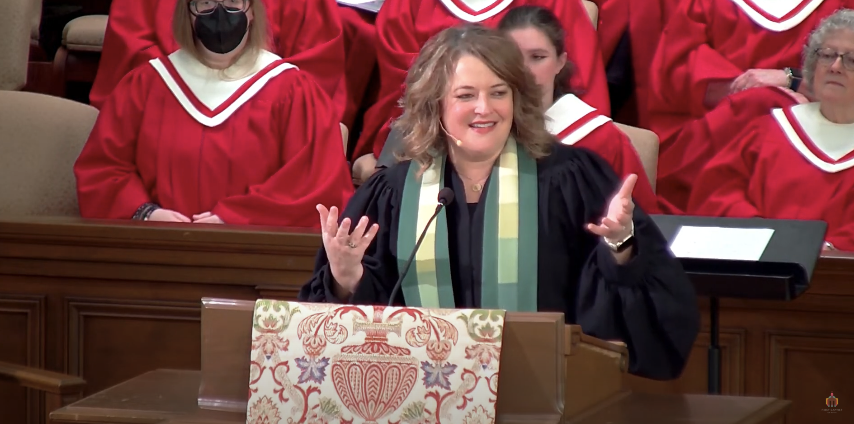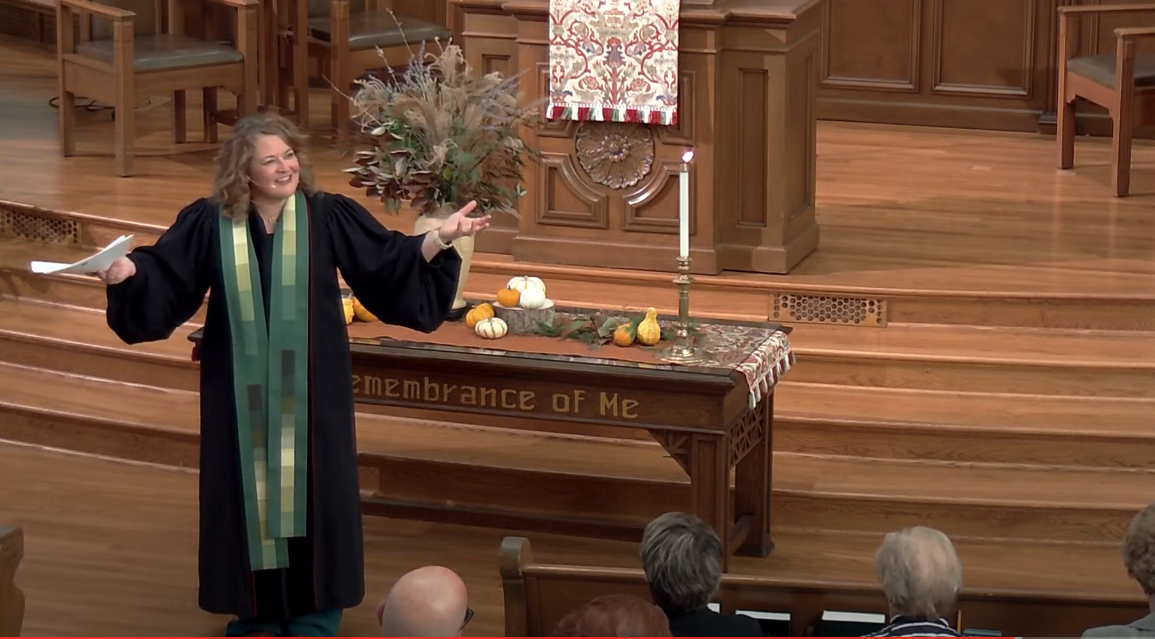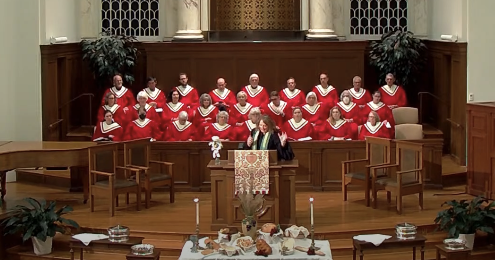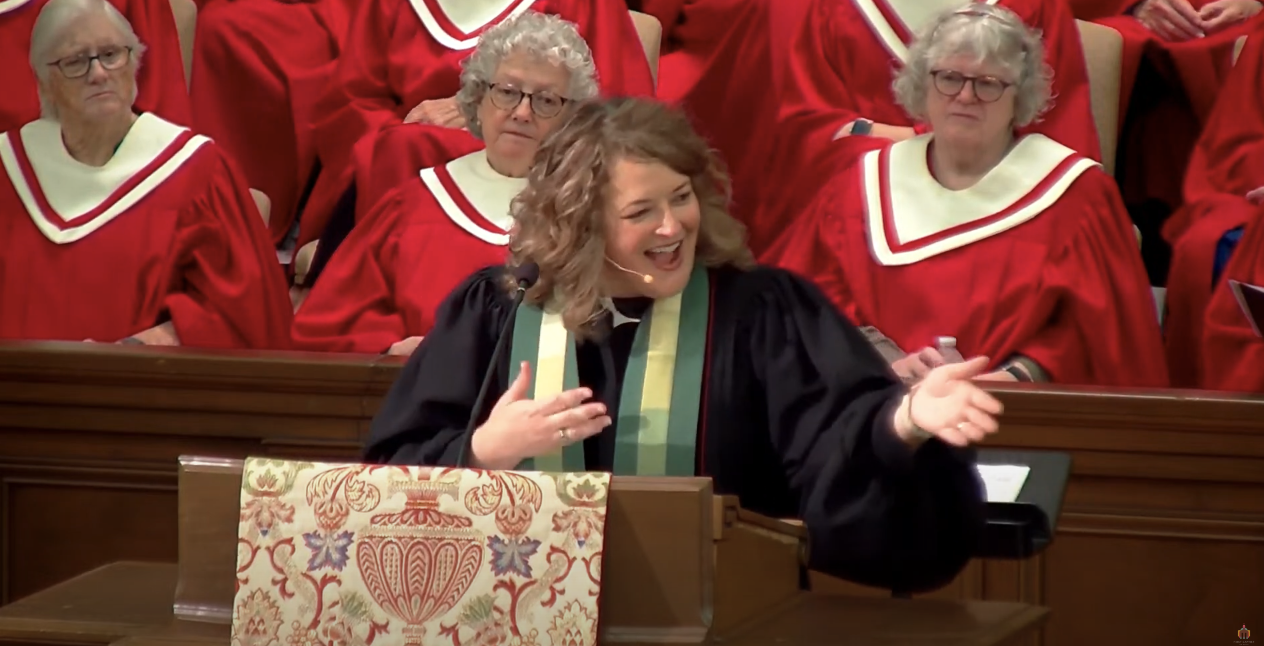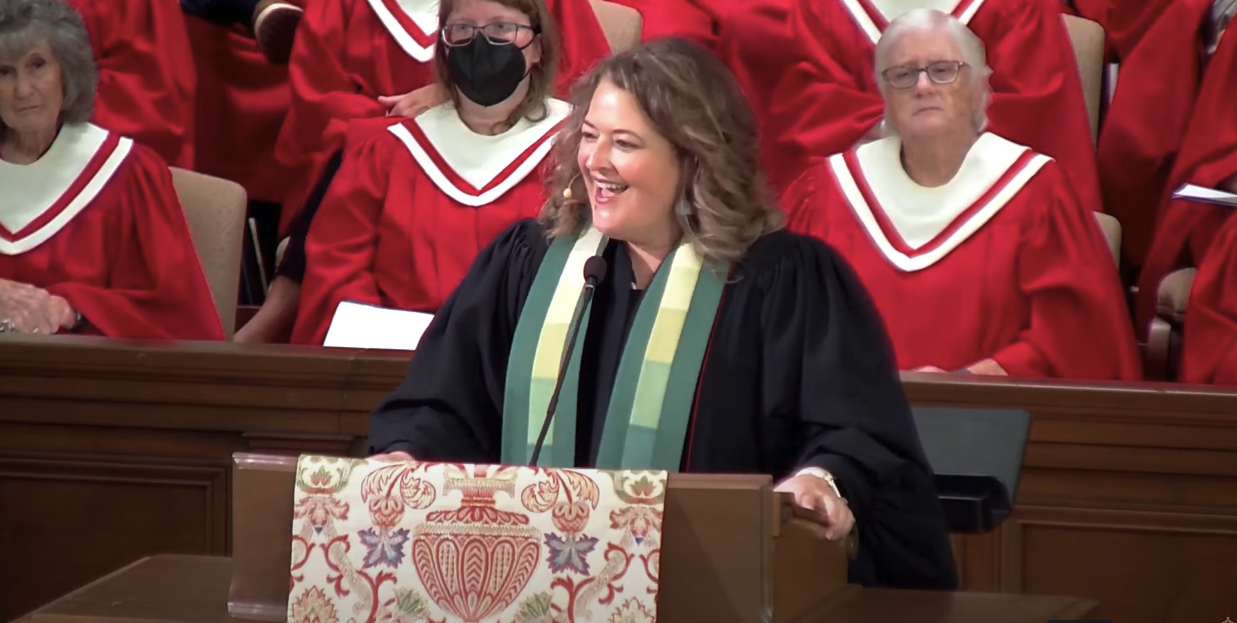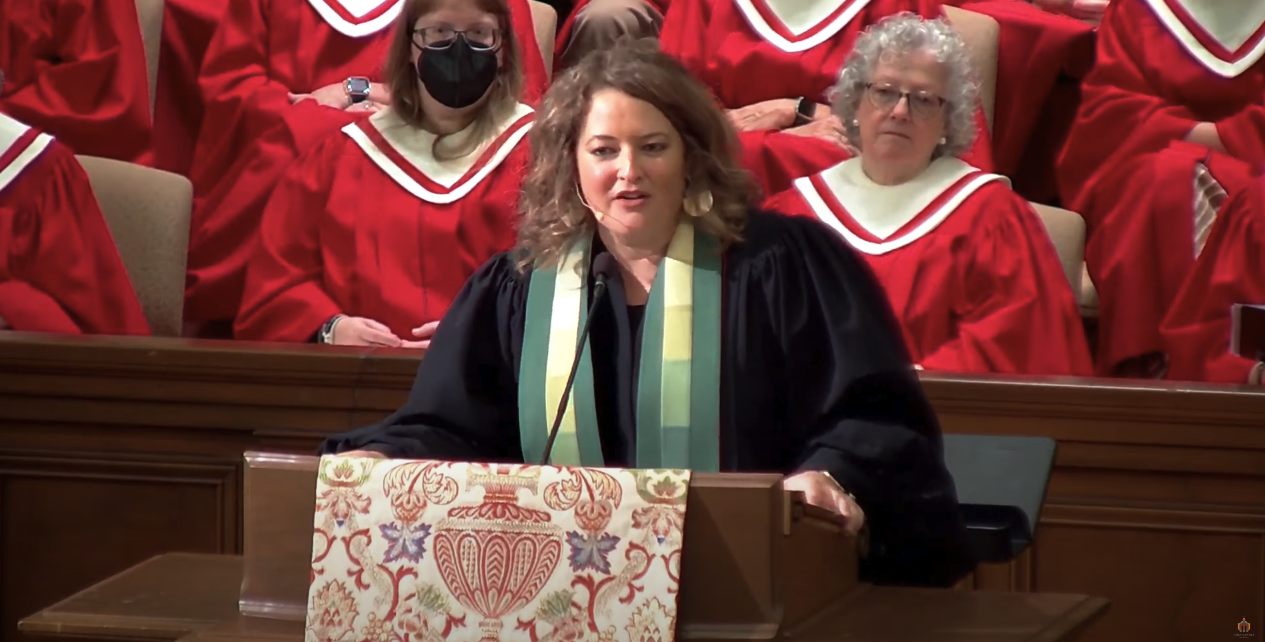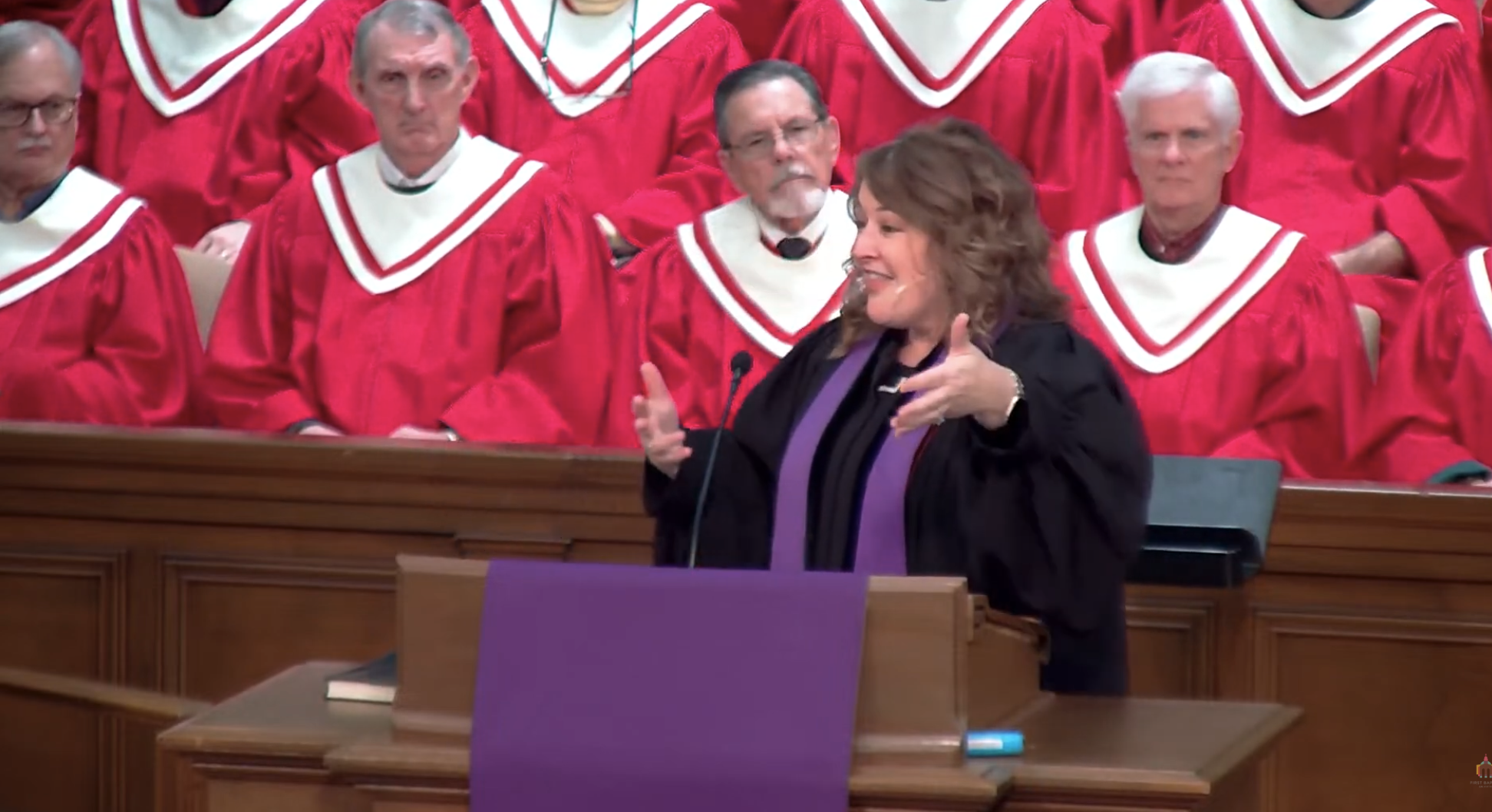I.Tell me – what are the durable stories in your life?
You know the ones I’m talking about: the stories that just seem to keep carrying on, the stories that last the test of time, the stories that don’t quite go away. Perhaps it’s a story from your family, like the one from my family of my grandmother’s great-grandmother, who, as legend has it, died while plowing her field at the age of 107! The story, of course, being that the Shannon women are rather hearty and will outlive the men! Perhaps it’s a story you tell yourself: “I’ll never be a runner,” or “I’ll always be late.” Perhaps it’s a story your friends tell each other: “we’re the kind of people who go to football games together,” or “we’re the kind of friends who have a fun group text.” Perhaps it’s a cultural story that we as Americans, or Southerners, or North Carolinians tell ourselves.
What are the durable stories that seem to sustain over time?
II.We’re talking today about sustainability, not just as a concept worthy of our study, but rather as a priority critical for our mission. Perhaps contrary to its most popular definitions, the term “sustainability” points to a broad understanding of life. It’s derived from the Latin word sustinere, or “to maintain, support, uphold, or endure.” So sustainability can be defined as “the ability to continue over a long period of time.”
To put a bit more color on that definition, I looked this week to public sectors that focus on the work of sustainability, for they surely have something to teach us. It was in 1987 when the United Nations Brundtland Commission defined sustainability as, “meeting the needs of the present without compromising the ability of future generations to meet their own needs.” This definition is durable, surely informing the work of our country’s Environmental Protection Agency, which says that, “sustainability is based on a simple principle: Everything that we need for our survival and well-being depends, either directly or indirectly, on our natural environment. To pursue sustainability is to create and maintain the conditions under which humans and nature can exist in productive harmony to support present and future generations.”
So in brief: sustainability is for carrying life on. Sustainability is for taking the long view. Sustainability is for thriving together over time.
And in our broader common life, we see these principles most commonly in three areas: environmental, economic, and social. So to be an environmentally-sustainable people means living in such a way that the resources available to us for our survival – land, water, air, sunlight, all creation – are available now, ten years from now, 100 years from now, 1000 years from now. To be an economically-sustainable people means conserving and investing our money in such a way now that we don’t deplete, but rather grow over time. To be socially-sustainable people means cultivating systems, structures, relationships, spaces, communities in such a way that they are equitable and diverse, connected and engaged, vulnerable and resilient, such that they support the well-being of current and future generations.
III.I’ve claimed in the sermon title that “Church is for Sustainability,” so we look to the sustaining text of scripture, durable over time. For today, let’s consider two particular texts that illuminate these truths.
The first from the Gospel of Matthew. You know this familiar parable of Jesus, this story told in three of the four gospels of the sower and the soils. In Matthew’s telling, Jesus is sharing this story – the first of many of his parables – to great crowds by the sea. “Listen!,” Jesus begins, “a sower went out to sow. Some seeds fell onto packed soil, and the birds ate it up. Some seeds fell to rocky soil, and they were scorched away. Some seeds fell into thorny soil, and they were choked out. But some seeds fell in good, rich soil, and they brought forth abundant harvest. Let those with ears to hear, listen!”
Now there are plenty of ways to interpret and apply this text from the Gospel of Matthew, but for today, I want us to consider the role of the good soil in light of sustainability. What if good soil is sustainable soil? That part of what makes the seeds take root is that the soil has been prepared with intention to receive them. That the work of the church isn’t just to sow the seeds, as important as that is and they are, but the work is also to prepare the soil. Prune back the dead pieces. Till and turn it. Add some fertilizer, some water, let it dry. Maybe a fresh bag of potting soil or two. Tend the good soil, for that’s what brings forth the harvest.
Farmer and poet Wendell Berry once said of soil – but perhaps of church too – “The soil is the great connector of lives, the source and destination of all. It is the healer and restorer and resurrector, by which disease passes into health, age into youth, death into life. Without proper care for it we can have no community, because without proper care for it we can have no life.” Good soil is sustainable soil.
Then from the book of James. We’ve heard James speak directly about action over these past few weeks – “doers of the word and not merely hearers only,” you remember. But today, he turns his focus to the power of the spoken word, particularly the thunderous capacity of the tiny little tongue to cause problems. He uses image after image to make his point: a bridled horse, a rudder on a ship, a forest set ablaze, salt water and fresh water, a fig tree and a grapevine. Indeed “the tongue causes a world of iniquity,” James says, staining the whole body, setting on fire the cycle of nature, itself set on fire by hell. Whew. (Now the irony isn’t lost on me that I’m speaking words to you about the peril of speaking words!) “But if we could keep our words from hurting others,” the First Nations Version translation says of verse two, “we would be mature human beings, able to aim our whole lives in the right direction.”
Man alive it’s hard, though, right? Our friend Bill Leonard reminds us, “early Christians could not ‘bridle’ the tongue; we push ‘send’ when we ought to push ‘delete.’” From the trivial to the profound, words carelessly or critically or callously spoken have consequences. Ask any middle school girl who has survived being the hot topic of gossip. Ask any kid who tries to half-heartedly believe the saying, “sticks and stones will break my bones but words will never hurt me.” Ask the person who has received an unsympathetic diagnosis or heard a vicious secret or told a heartless lie. Ask any queer person who still loves Jesus, still has hope or interest in the church after hearing a pastor condemn them to hell. Ask the enslaved people of Galveston when word of the Emancipation Proclamation finally arrived. Ask the Haitians of Springfield, Ohio. Ask your family member or friend after you’ve hurt their feelings. Ask yourself when you’ve been wounded too. The words we say matter.
Yet the call from James here isn’t not to say something hard, not to press when matters of conscience dictate otherwise, not to be silent in the face of injustice. No! Rather, he simply says, don’t be hateful. Let your words bear good fruit. Peter Marty said, “Language is a gift that determines how we care about each other. How we speak and listen bestows either life or death. Communities of faith exist, among other reasons, to maintain a quality of discourse that denies a place for coercive, dismissive, or manipulative language.” Or as journalist Krista Tippett puts it, “The words we use shape how we understand ourselves, how we interpret the world, how we treat others.”
Put another way – words create worlds. Words can heal and reconcile, just as words can harm and inflict violence. Words can bind or release, spark or dull. Words change lives. Words, chosen carefully, are sustainable.
IV.Some ten years ago when I was in conversation with the Pastor Search Committee of this beloved church, you could say I was equal parts thrilled and terrified. As I considered what this potential call might mean in my life, my family, my vocation, I was so curious to learn more about the church, but unsure what that would tell me when they told me. I found myself asking the search committee for durable stories, stories that capture the First on Fifth spirit.
I heard a number of those, but I’ll never forget the one that Scott Hudgins shared with me about his son, Daniel. Daniel had grown up in our church from the very start. He came through our children’s ministry, singing the songs of faith and learning the stories of Jesus from Sunday School teachers and choir directors and missions leaders alike. He made his way down the aisle to commit his life to Jesus, and was baptized right behind me by his pastor, David Hughes. He was active in the youth group, hardly ever missing a Sunday School class or a fellowship event, a trip or a retreat. He was as wholly immersed in the life of the church as anyone.
Daniel was an old soul in a young body, who wore navy blazers to church business meetings as a teenager, bless him. Practically a Deacon chair at the age of 16! And in those church business meetings over the years, he began to hear that his church was in decline! That membership numbers had been falling for years! That money was tight, and buildings were costly, and the future was uncertain, and by golly, we better do something so the church will survive! Scott described all of this for me before I ever knew Daniel, and then said, “but you see, Daniel knew nothing about this. He didn’t have the burden of memory of the 1960s and the membership rolls that bore 2000 names. He didn’t look around the community to anxiously measure which churches were outpacing us. He merely knew this church. He knew her people. He knew that here, he was loved. This was his wonderful church, imperfect and hopeful as we are.”
I learned a lot in this durable story: about Scott and Mary and Daniel, of course, but I learned about you. About a church with good soil. About the power of words to form worlds. About the hope that simmered right here in our midst. About this church’s commitment to carrying life on. For taking the long view. For thriving together over time.
V.Friends, the church is for sustainability. Sustainability of what we can see: our buildings, our money, our assets, our people. But sustainability too of what we can’t see, what we can more easily feel and articulate: our vision, our hope, our calling, our future. Sustainability for carrying life on. For taking the long view. For thriving together over time. Because God in Christ first sustained us.
Perhaps, then, it’s the job of you and me to ensure the soil of our church is good, sustainable, rich. Not to let our church life get pecked and pilled by the circling hordes that would eat it up. Not to allow ourselves to harden, rocky, without the fertile fluidity this work requires. Not to foster a certain type of thorny culture where whispers, gossip, and despair are given air and space to take hold. Rather, a church of good soil. A thriving center full of people who understand the fruits and harvest that come from our words and deeds carefully planted like seeds, watered by our shared imagination, so that God can give the growth.
You’ve seen that our building project prioritizes these commitments of sustainability in what we’re doing: adding solar panels and electric vehicle chargers on the property, completing minor renovations to make a major impact. But hear too our commitments to sustainability within what we’re not doing too: not building buildings we can’t sustain, with resources we don’t have, not giving room to any despair that leads us nowhere good.
Friends, this church is for sustainability.
How else might we live out those commitments to sustainable living, as individuals and as a church? Perhaps we remember that sometimes less is more. Simplicity matters; creativity can be its fuel. Mutuality and trust are essential to grow our beloved community’s well-being. Wisdom shared is among our greatest renewable resources.
I’m reminded that Desmond Tutu was fond of sharing a Kenyan proverb that says, “The world was not given to you by your parents; it was lent to you by your children.”
The church is for sustainability. How will you carry it on?
Amen.


